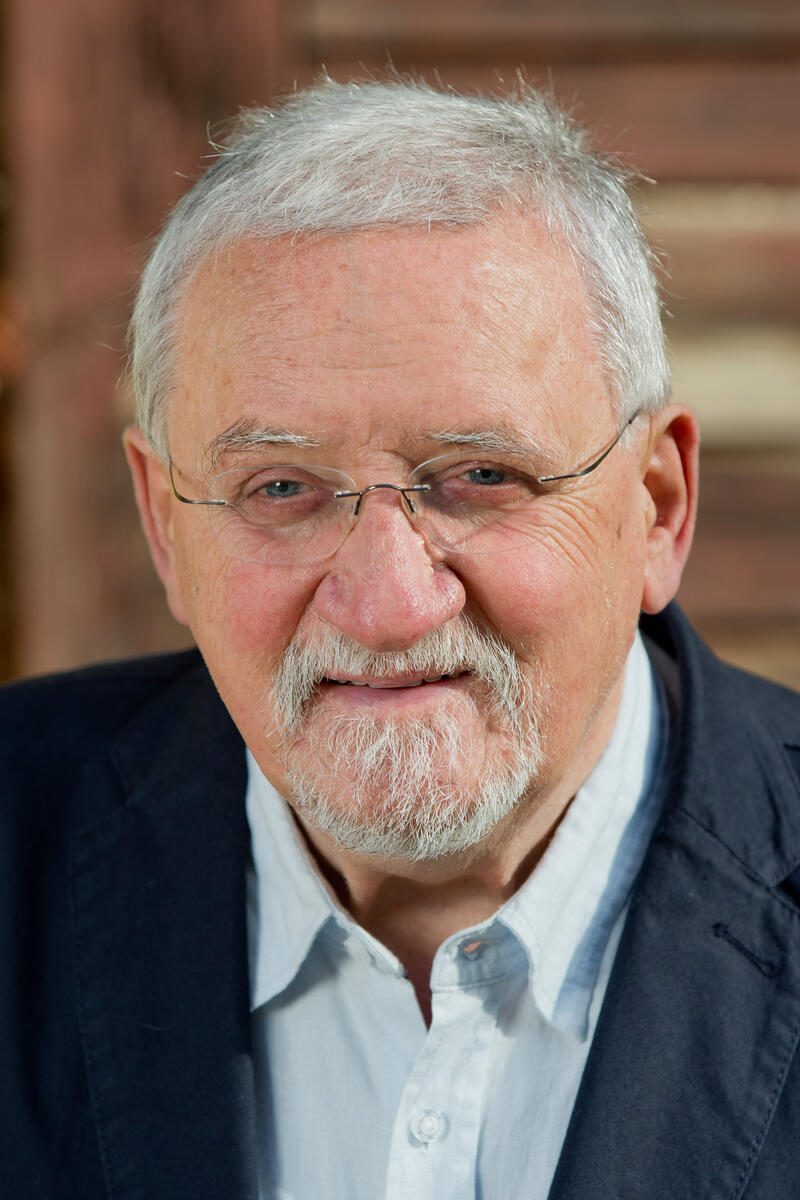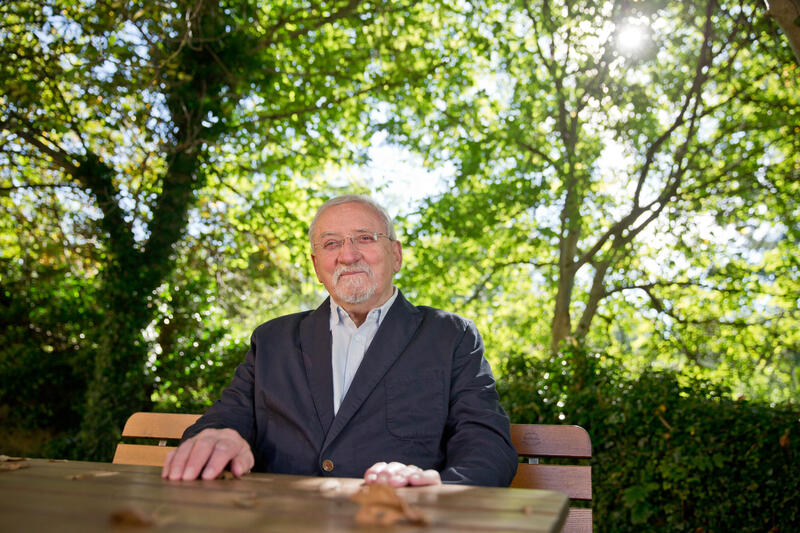“Moved organised nature conservation out of its niche into the centre of our society”
“Hubert Weinzierl is one of the very few of our contemporaries to have moved organised nature conversation out of its niche into the centre of our society.” This is how Dr. Heinrich Bottermann, the Secretary General of the Deutsche Bundesstiftung Umwelt (DBU), today commended the lifetime achievement of this environmentalist and nature conservationist. Weinzierl, a trained agriculturalist and forest manager, had been working in the field of ecology and nature conservation for 60 years, Bottermann said. “Weinzierl is not a leading personality, but the leading personality in nature conservation in Germany. He has set major trends with regard to sustainability, responsibility for nature and the protection of diversity. He knows how to reconcile his passion for nature with the modern spirit of commerce.” For this record of achievement, Weinzierl will receive the DBU's “Honorary Lifetime Achievement Award” on 26 October from German President Joachim Gauck during the presentation ceremony for the German Environmental Award of the DBU in Kassel.
“Most prominent conservationist in Germany”
“Pioneer, visionary, president of 'Naturschutz': Hubert Weinzierl is considered by many as the most prominent conservationist in Germany and as someone who integrates traditional nature conservation with modern environmental policies,” Bottermann said. For Weinzierl, nature conservation was not a job, but a way of thinking, he said. Ever since studying forest management, Weinzierl had been involved in the nature conservation movement actively and with great moral courage, according to Bottermann. One particularly important phase in his work as a conservationist was the founding of the national park in the Bavarian Forest, to which he made a decisive contribution, and his involvement in creating the first environment ministry in Bavaria, Bottermann said. The DBU Secretary General said the major processes motivating the enterprising environmentalist were reconciling ecology and politics, and making conservation a political issue across party lines. In pursuing these goals, he had not shied away from confronting politicians, always with the aim of bringing about globalised, holistic policies for the world and the environment, according to Bottermann.
From businessman to an important pioneer of the ecology movement
“Weinzierl's personal experience, in which he moved from being a businessman to become an important pioneer of the ecology movement in Germany, proves that economy and ecology need not be contradictory terms,” Bottermann said. As the son of a family in the pit and quarry business, Bottermann said, Weinzierl learnt to combine his passion for nature with modern commercial management methods. As far back as the 50s, he had initiated large-scale recultivation measures for gravel pits. In converting his farm to organic methods, he had carried out pioneering work and contributed to the development of ecological farming.
Impulses for sustainable lifestyle and practical species conservation
Bottermann went on mention the exemplary impulses given by Weinzierl to environmental education, creating a sustainable lifestyle, the encounter between cultural and natural sciences and practical species conservation – such as the returning of eradicated species such as beavers, eagle owls, lynxes and wild cats to their original habitats. Weinzierl, he said, had always pointed out that Germany had a lot of catching up to do in preserving biological diversity and that the destruction of species was advancing unchecked. He said Weinzierl had highlighted the way that the destruction of biological diversity and species extinction were being pushed along by climate change and the competition for habitats, and had called for moors and intact wooded areas to be protected as storage for carbon dioxide. According to Bottermann, Weinzierl had seen no alternative to the increased use of renewable energy sources in view of the finite nature of fossil fuels, the measurable changes in the climate and the obligation towards future generations. Weinzierl had earned the “Honorary Lifetime Achievement Award” of the DBU, Bottermann said, because he saw nature conservation and environmentalism as a personal vocation, and had always practised both these things in his personal life in times when a growing economy was accompanied by much environmental pollution. For example, with the action “Clean Landscape” that he founded in 1970, Weinzierl had initiated the then completely new idea of recycling as a means of fighting the dramatic environmental pollution caused by the thoughtless discarding of rubbish, Bottermann said.
Modern understanding of environmental associations
The list of Weinzierl's honorary functions and posts in nature conservation associations and organisations is a long one: member of the presidium of the German League for Nature, Animal Protection and Environment (DNR) in 1964, honorary government commissioner for nature conservation in Bavaria from 1965 to 1972 and special commissioner of the DNR for the European Year of Nature Conservation in 1970. From 1969 until 2002, Weinzierl was the chairman of the Bund Naturschutz in Bayern (BN). Even in Weinzierl's young years, his organisational strategies helped to transform it from a small, non-political association that was rather social in nature to an important organisation representing nature conservation and environment-political interests and to expand it into a national federation, the Friends of the Earth Germany (BUND), Bottermann said, becoming the latter's chairman from 1983 to 1998. Weinzierl had influenced and practised a modern understanding of non-governmental organisations in Germany, according to Bottermann.
Great commitment to the DBU: Securing the national natural heritage
For ten years, from 2002 to 2012, Weinzierl was president of the German League for Nature, Animal Protection and Environment (DNR) and from 2001 to 2013 he was a member of the Council for Sustainable Development of the German government. For a decade, from 2003 to 2013, he was chairman of the Board of Advisors of the DBU, a post in which he invested much time. “His commitment to the DBU was the product of conviction and a great sense of responsibility, and came from the bottom of his heart. As chairman of the Board of Advisors, his main concerns were securing the national natural heritage, education on sustainable development and the debate on lifestyles, Bottermann said. Bottermann gave as an example Weinzierl's role in initiating the foundation of Naturerbe, a non-profit-making subsidiary of the DBU. Since then, the DBU itself is active in German efforts to protect nature and species, having taken over and secured some 60,000 hectares of large, mostly undivided natural habitats.
Active on the international nature conservation stage
Weinzierl also played a central role on the large, international stage of environmental protection even early on, Bottermann said: at the Environment Conference of the United Nations (UN) in Stockholm in 1972, at the Earth Summit in Rio de Janeiro in 1992 and in 2002 as a member of the German delegation to the Earth Summit in Johannesburg. In the 60s and 70s, he said, Weinzierl had gathered information about local problems of nature conservation on trips to every continent. He also mentioned how Weinzierl had recorded his experiences, impressions and his expert knowledge on conservation in more than 50 publications and numerous specialist articles.
Lifetime achievement: Nature conservation as part of sustainable development
Bottermann: “The 'Honorary Lifetime Achievement Award' is intended as a visible sign for Hubert Weinzierl's achievement and influence on important ecological developments, events and successes.” For 60 years, Bottermann said, nature conservation had been an integral part of sustainable development for Weinzierl. For this reason, he said, Weinzierl had always credited the involvement of environmental and nature conservation foundations with an important function, also for the future. Together with his wife, the theologist Beate Seitz-Weinzierl, he had built a environmental education centre in Wiesenfelden in Bavaria, surrounded by nature reserves and varied landscapes as places for learning and experiencing the environment, Bottermann said. To ensure the continued existence of the educational centre, he had founded the “Beate and Hubert Weinzierl Foundation” for the promotion of environmental education and education on sustainable development and environmental and nature conservation in 2006, according to Bottermann.
“Honorary Lifetime Achievement Award” presented for fourth time – 10,000 euros in prize money
The DBU is presenting the “Honorary Lifetime Achievement Award” for the fourth time this year as part of the altogether 500,000-euro German Environmental Award, the most lucrative environmental prize in Europe. Previous winners of the Honorary Award have been Mikhail Gorbachev, Professor Hannelore “Loki” Schmidt (†) and Professor Heinz Sielmann (†).

© Daniel Karmann/DBU

© Daniel Karmann/DBU